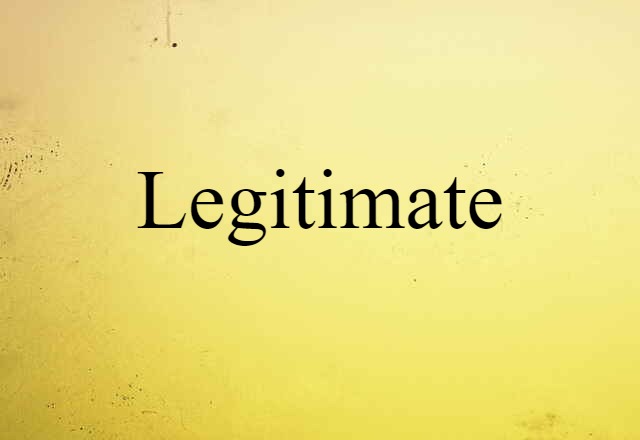- according to law; lawful: the property's legitimate owner.
- in accordance with established rules, principles, or standards.
- born in wedlock or of legally married parents: legitimate children.
- in accordance with the laws of reasoning; logically inferable; logical: a legitimate conclusion.
- resting on or ruling by the principle of hereditary right: a legitimate sovereign.
- not spurious or unjustified; genuine: It was a legitimate complaint.
- of the normal or regular type or kind.
- of or relating to professionally produced stage plays, as distinguished from burlesque, vaudeville, television, motion pictures, etc.: an actor in the legitimate theater.
- to make lawful or legal; pronounce or state as lawful: Parliament legitimated his accession to the throne.
- to establish as lawfully born: His bastard children were afterward legitimated by law.
- to show or declare to be legitimate or proper: He was under obligation to legitimate his commission.
- to justify; sanction or authorize: His behavior was legitimated by custom.
- the legitimate theater or drama.
- a person who is established as being legitimate.
- born in lawful wedlock; enjoying full filial rights
- conforming to established standards of usage, behaviour, etc
- based on correct or acceptable principles of reasoning
- reasonable, sensible, or valid
- authorized, sanctioned by, or in accordance with law
- of, relating to, or ruling by hereditary right
- of or relating to a body of famous long-established plays as distinct from films, television, vaudeville, etc
- to make, pronounce, or show to be legitimate

More Definitions
- TERMINUS (noun) Definition, Meaning & Examples
- SPECULATE (noun) Definition, Meaning & Examples
- ERECTILE IMPOTENCE (noun) Definition, Meaning & Examples
- OCCIPITAL BONE (noun) Definition, Meaning & Examples
- POINT THE FINGER AT (noun) Definition, Meaning & Examples
- LATIFUNDIUM (noun) Definition, Meaning & Examples















